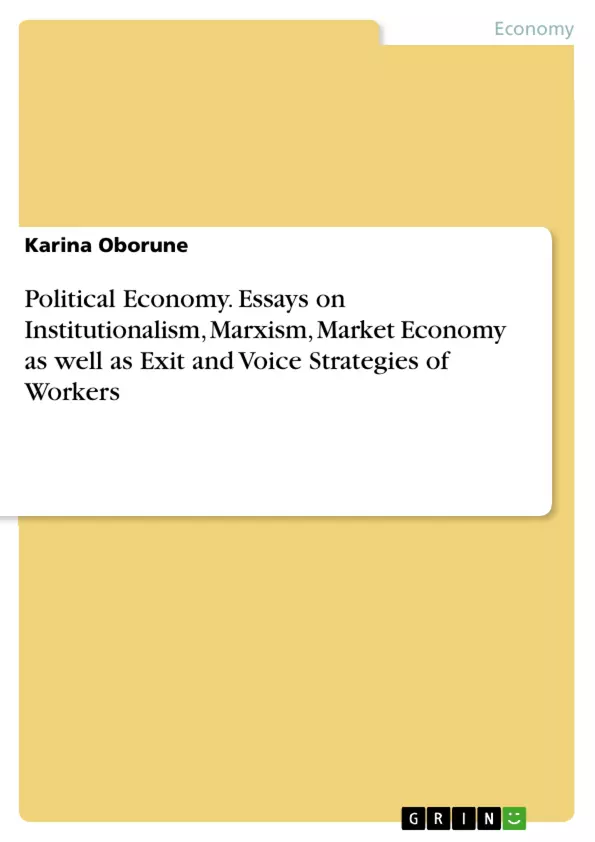The essays in this work deal with the main differences between historical institutionalism, sociological institutionalism and rational choice institutionalism, discuss the contribution of Marxism to political economy, evaluate the likelihood of exit and voice strategies of tea workers in a presented empirical condition and deal with the question "What is the impact of Latvia’s established welfare system on the mode of institutional change in the healthcare sector?".
Inhaltsverzeichnis (Table of Contents)
- Question 1
- The main differences between historical, rational choice and sociological institutionalism
- North argues against the neoclassical assumptions on economic behavior of individuals
- "Revised behavioral assumptions"
- Question 2
- The contribution of Marxism to political economy (PE)
- The relevance of Marxism in modern political economy after the fall of state socialism
- Question 3
- Exit and voice in coordinated market economy (Germany, Japan)
- Exit and voice in liberal market economy (US)
- Exit and voice in producers-suppliers relationship in coordinated market economy (Japan)
- Question 4
- Exit
- Voice
- Transaction costs
- Loyalty
- Question 5
- Introduction
- Background Information
- Research question
- Hypothesis
- Contribution
- Literature review
- Methodology
- Limitations
Zielsetzung und Themenschwerpunkte (Objectives and Key Themes)
The primary objective of this work is to examine the theoretical frameworks of political economy and apply them to empirical research questions. The main focus lies on understanding the relationship between institutions and economic behavior, specifically within the context of market economies and the role of voice and exit strategies.
- The differences and contributions of various institutionalist theories, including historical institutionalism, sociological institutionalism, and rational choice institutionalism.
- The impact of institutional structures on economic behavior and how these structures revise neoclassical assumptions.
- The role of Marxism in political economy, both historically and in contemporary contexts.
- The dynamics of voice and exit strategies in different market economies, with a focus on coordinated and liberal market economies.
- The application of theoretical frameworks to empirical cases, illustrated by the example of tea workers' working conditions and the impact of Latvia's welfare system on healthcare institutional change.
Zusammenfassung der Kapitel (Chapter Summaries)
The first chapter delves into the theoretical foundations of institutionalism, comparing and contrasting different approaches such as historical, rational choice, and sociological institutionalism. It examines the critique of neoclassical assumptions on economic behavior and how institutional theories revise these assumptions.
The second chapter explores the contribution of Marxism to political economy, highlighting its historical significance and its continued relevance in the modern context, particularly in light of the collapse of state socialism.
The third chapter focuses on the concepts of voice and exit, exploring their operation in both coordinated and liberal market economies. It provides a theoretical discussion on the likelihood of exit and voice strategies in producer-supplier relationships within these different economic models.
The fourth chapter presents a case study on tea workers' working conditions, drawing evidence from the documentary "The bitter taste of tea." It analyzes the likelihood of exit and voice strategies for these workers in the presented empirical context, considering factors such as transaction costs and the role of loyalty.
The fifth chapter focuses on developing a research proposal to investigate the impact of Latvia's welfare system on institutional change in the healthcare sector. It outlines the research question, hypothesis, and proposed methodology, providing empirical evidence as background information.
Schlüsselwörter (Keywords)
Key terms and concepts central to this text include: institutionalism, historical institutionalism, rational choice institutionalism, sociological institutionalism, Marxism, political economy, market economies, coordinated market economy, liberal market economy, voice, exit, transaction costs, loyalty, welfare system, healthcare sector, institutional change.
Frequently Asked Questions
What are the main types of institutionalism?
The three main types are historical institutionalism, rational choice institutionalism, and sociological institutionalism, each focusing on different ways institutions shape behavior.
How does Marxism contribute to modern political economy?
Marxism provides a critical framework for understanding class relations and power dynamics in economic systems, remaining relevant even after the fall of state socialism.
What is the "Exit and Voice" strategy in market economies?
Based on Hirschman's theory, "Exit" refers to leaving a relationship (e.g., quitting a job), while "Voice" refers to trying to change it from within (e.g., through unions or protests).
How do liberal and coordinated market economies differ?
Liberal economies (like the US) rely more on market mechanisms and "Exit," while coordinated economies (like Germany or Japan) rely on long-term relationships and "Voice."
What is the impact of welfare systems on healthcare change?
Existing welfare institutions can either facilitate or hinder institutional change in the healthcare sector, as seen in the case study of Latvia.
- Citation du texte
- Karina Oborune (Auteur), 2010, Political Economy. Essays on Institutionalism, Marxism, Market Economy as well as Exit and Voice Strategies of Workers, Munich, GRIN Verlag, https://www.grin.com/document/157904



